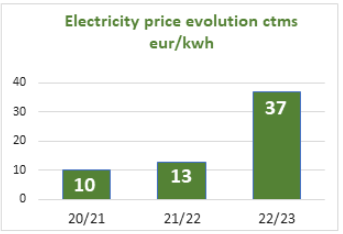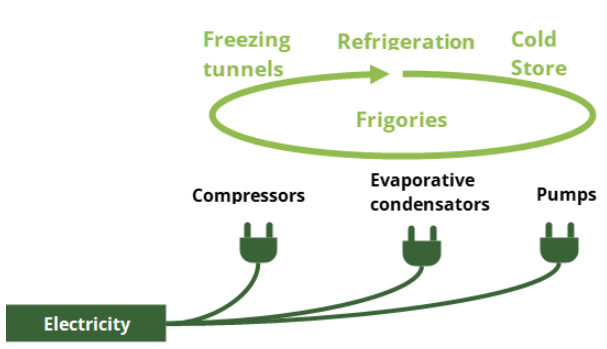Ardo is an international group committed to the production of high quality fresh frozen products. Ardo´s leitmotiv is to preserve the nutritional properties of vegetables, by freezing them right after the harvest. The group consists of 20 factories strategically located near the fields in 9 different countries. The company produces 947000 tonnes of fresh frozen products coming from 50000 hectares of growing fields.

Minimising the environmental impact of food processing is a European strategic objective, particularly in the current socio-economic context, amid the skyrocketing rise of energy prices. Our partner Ardo is strongly committed with this objective, and has established the MIMOSA programme to minimise the environmental impact of growing and production activities.

CLARUS Strategy is to utilize innovative AI techniques to leverage energy consumption and production monitoring data. The focus is the cooling installation which represents 60% of the total electricity consumption. Energy prices are pushing production costs and the optimization of energy consumption is a priority to ensure sustainability and profitability. The cost of energy increased a 285% in the last year, and the optimization of the cooling installation, which is the most energy demanding resource, can yield a significant reduction of the energy costs.
In short, the cooling installation is the infrastructure used to freeze the products while they travel across freezing tunnels at -40ºC, and to keep the products at -26ºC in the cold storage warehouses. The main function of the system is to turn electricity into frigories,compressing refrigerant gas (ammonia) to the pressure required to achieve the desired temperature. As the refrigerant (now in liquid state) traverses the distribution system, it absorbs heat from its surroundings, lowering the temperature of the tunnels and cold stores, and changing back to gas state in the process. The gas is returned to the compressors to establish a closed circuit, and through evaporative condensers to release the generated heat.

The challenge is to measure the refrigeration capacity of the installation or COP indicator, defined as the ratio of the frigories kwh and electrical kwh, in real time, and use this information to implement preventive and corrective strategies to optimize energy consumption. Measuring the COP together with environmental conditions and production information will allow to detect anomalies in the installation, even before the occur. However, measuring the COP is not trivial given the complexity of the installation. The strategy of CLARUS is to monitor energy consumption and use virtual sensing techniques to estimate the COP. Based on this data, CLARUS researchers will develop predictive and detection models to minimize the occurrence and impact of maintenance incidences of the cooling installation (such as breakdowns in wells, leaks, or regulation problems in compressors). ARDO will assess the energy consumption per unit produced, and through continuous improvement methodologies, the energy performance KPIs will be optimized. The company expects an impact of a 20% reduction of the energy used in the cooling installation with this use case.
The pilot is hosted by Ardo Benimodo, the factory of the group in Valencia (Spain). The project team members are Isabel Gonzalez (Factory Manager), Paulo Carcel (Security Manager), and Bernardo Navasquillo (Maintenance Manager).




